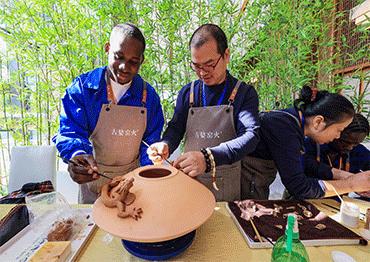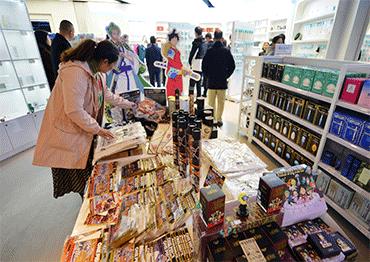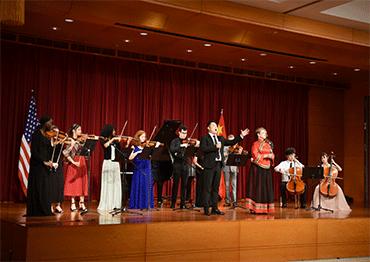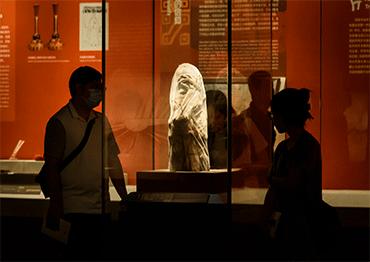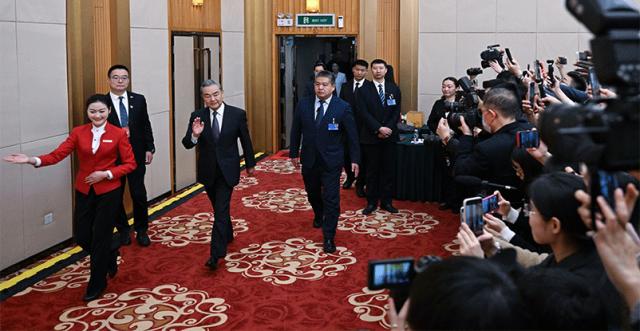
Chinese Foreign Minister Wang Yi (center, waving), also a member of the Political Bureau of the Central Committee of the Communist Party of China (CPC), prepares to speak on China’s diplomatic policies and foreign relations at a press conference during the third session of the 14th National People’s Congress, March 7, 2025 (Photo by VCG)
On March 11, China’s annual two sessions, the country’s most important annual political event, concluded in Beijing. As a platform for the Chinese government to set up economic targets and policy directions for the year, the meetings primarily focus on domestic issues, such as economic development and social policies.
However, with the Trump administration’s return to office in January and its unconventional approach to global affairs having brought more uncertainty to the global economic and political landscape – including escalating tensions in China-US relations, the Chinese leadership has drawn increased attention for its foreign policy rhetoric. How China navigates this shifting geopolitical landscape was a key focus for China watchers during this year’s two sessions.
On March 7, Chinese Foreign Minister Wang Yi, also a member of the Political Bureau of the Central Committee of the Communist Party of China (CPC), held a 90-minute press conference on the sidelines of the third session of the 14th National People’s Congress (NPC). His remarks attracted considerable attention.
Speaking on a range of topics and answering questions from both domestic and international journalists, Wang articulated China’s perspective on the shifting world order, portraying China as a responsible global power and a stabilizing force in a world that has been upended by the Trump administration.
The US imposed additional 10 percent tariffs on almost all imports from China in early February. On March 3, the day before the two sessions kicked off, the additional tariffs were raised to 20 percent. The US accused China of failing to curb the flow of the opioid fentanyl into the US.
In both cases, China responded swiftly with retaliatory measures. On March 4, China announced the imposition of additional tariffs of 10-15 percent on certain American agricultural and food products. It also announced immediate export controls on 15 US entities in the defense industry and added 10 US companies to its Unreliable Entity List.
The same day, the Chinese embassy in the US released a statement on X, formerly Twitter, stressing that the US government should take responsibility for its fentanyl crisis rather than “smearing and shifting blame to China.”
The statement and the immediate response signaled a tougher stance from China toward the US compared to Trump’s first term.
When asked how China will engage differently with the current Trump administration compared to the first one, Wang echoed the sentiment conveyed in the Chinese embassy’s statement. “No country should fantasize that it can suppress China and maintain good relations with China at the same time,” Wang said. “Such a two-faced approach is not good for the stability of bilateral relations or for building mutual trust.”
On the issue of fentanyl, Wang stressed that China has put in place “the toughest and most comprehensive narcotics policy in today’s world,” and had put all fentanyl-related substances under strict controls following the US’s request in 2019, the first country in the world to do so. Reiterating that the problem must be confronted and resolved by the US, Wang said that “the US should not return good with evil or even impose arbitrary tariffs,” adding “no responsible major country should do that.”
Citing the Chinese saying “If one’s action fails, look for the reason within oneself,” Wang urged the US to reflect on what it achieved from its tariff and trade wars in the past years. “Has its trade deficit widened or narrowed? Has its manufacturing become more competitive or less competitive? Has the US inflation gone up or down? Has the life of its people got better or worse?” Wang asked.
“China-US business relations are based on two-way and reciprocal interactions. Cooperation will bring about mutual benefit, and China will definitely take countermeasures in response to arbitrary pressure,” Wang added.
Noting that China “never provokes and will not be intimidated by provocations,” Wang said that “no maximum pressure, threat or blackmail can undermine the unity of the 1.4 billion people or stop our historic stride toward the great rejuvenation of the Chinese nation.”
Regarding the US’s high-tech curbs on China, Wang quoted a Chinese verse: “No mountain can stop the flow of a mighty river.” Citing China’s technological advances over recent years, including its space program and AI model DeepSeek, Wang said that China’s drive to become a science and technology powerhouse is unstoppable.
Speaking at an event laying out China’s overall diplomatic approach, Wang’s rhetoric went beyond the bilateral relationship. In essence, Wang presents China as a responsible, predictable and stable global power in stark contrast to what many perceive as a bullying, chaotic and hypocritical US.
In answering a question about Trump’s “America First” policy raised by CNN, Wang warned, without referring to the US explicitly, that the obsession over the so-called “position of strength,” a concept raised by both the Biden administration and the Trump administration, would lead the world to the “law of the jungle” again.
“Smaller and weaker countries would bear the brunt first, and international norms and order would take a body blow,” Wang said. Stressing that “a big country should honor its international obligations and fulfill its due responsibilities” rather than put selfish interests before principles and bully the weak, Wang said that “China stands firm on the side of international justice and resolutely opposes power politics and hegemony.”
“A saying in the West goes, ‘There are no eternal friends, only permanent interests,’ ” Wang said, paraphrasing a quote attributed to former UK prime minister Lord Palmerston (1784-1865). “But we in China believe that friends should be permanent and we should pursue common interests,” Wang added.
In response to another question about the role China intends to play in the world, Wang said that as “certainty is becoming a scarce resource” in a “changing and turbulent world,” China will provide certainty to this uncertain world. Emphasizing that the choices of major countries will determine “the trajectory of our times” and shape the future of the world, Wang said China will “stand firm on the right side of history and on the side of human progress.”
Responding to a question about the danger that the UN-based post-WWII world order is facing, Wang said that China is a founder and beneficiary of the post-WWII international order. “Naturally, we are an advocate and builder of it as well. We have no intention to start all over again, nor do we support any country’s attempt to overturn the current order,” Wang added.
In an apparent veiled criticism of the US, Wang said that “major countries in particular should take the lead in upholding integrity, embracing the rule of law and opposing double standard and selective application. Still less should they resort to bullying, monopoly, trickery or extortion.”
Wang also highlighted the importance of the Global South, which Wang said “holds the key to bringing stability to the world and making it a better place.”
“The hallmark of our era is the prominent, growing strength of the Global South,” Wang added. Highlighting the upcoming Shanghai Cooperation Organization Summit, the BRICS Summit and the G20 Summit, which will be hosted by China, Brazil and South Africa respectively in 2025, Wang called on countries of the Global South to “speak in one voice to the world, safeguard our common interests and steadily increase our representation and voice in global governance.”
Wang pledged that China will continue to expand global partnerships and “write a new chapter of the Global South seeking strength through unity.”
He also addressed China’s relations with India, a heavyweight Global South country and a member of the US-led Quadrilateral Security Dialogue (QUAD), which also includes Australia and Japan. In the past few years, India has been locked in a territorial dispute with China that has paralyzed cooperation between the world’s two most populous countries.
Noting that China-India relations have made positive strides since Chinese President Xi Jinping and Indian Prime Minister Narendra Modi met in Kazan, Russia during the 16th BRICS Summit in October 2024, Wang said that a “cooperative pas de deux of the dragon and the elephant” is the only right choice for the two countries.
“China and India have a shared task to accelerate our countries’ development and revitalization. There is every reason for us to support each other rather than undercut each other, work with each other rather than guard against each other,” Wang added.
On China’s relationship with Russia against the backdrop of renewed talks between the US and Russia, Wang said the two countries have forged “a mature, resilient and stable” relationship that “will not be swayed by any turn of events, let alone be subject to interference by any third party.”
On China’s relations with the EU, Wang said that China remains confident in it as a “trustworthy partner.” However, Wang did not directly answer a question from Bloomberg on the possibility of China sending peace-keeping troops to Ukraine, and emphasized that China has continued to advocate for peace talks to “create conditions and build consensus for resolving the crisis.” “The negotiating table is where the conflict ends and peace starts,” Wang said.
Wang did not make any surprising comments or hint at any major policy changes during the press conference. However, Wang’s press conference apparently sends a message that China is more confident and resolute in advancing its diplomatic policies and China is ready to inject more stability and certainty to the world.
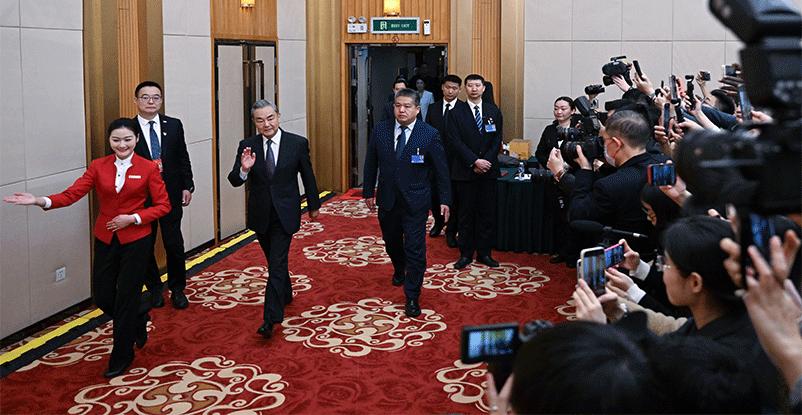
 Old Version
Old Version

